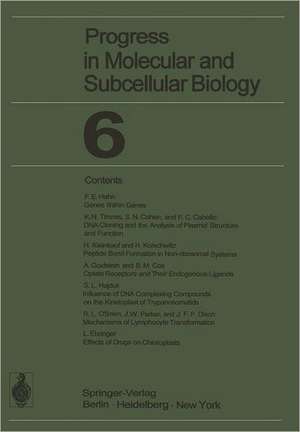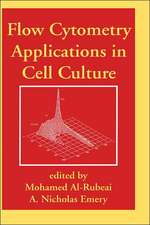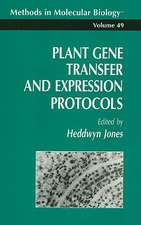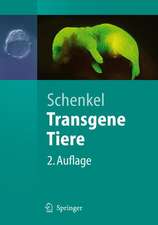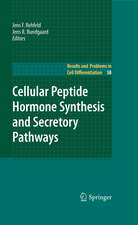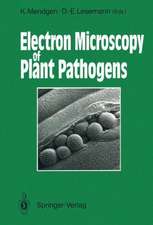Progress in Molecular and Subcellular Biology: Progress in Molecular and Subcellular Biology, cartea 6
Contribuţii de F. C. Cabello, S. N. Cohen, B. M. Cox, J. F. P. Dixon, L. Ebringer, A. Goldstein, F. E. Hahn, S. L. Hajduk, H. Kleinkauf, H. Koischwitz, R. L. O'Brien, J. W. Parker, K. N. Timmisen Limba Engleză Paperback – 12 noi 2011
Din seria Progress in Molecular and Subcellular Biology
- 18%
 Preț: 1115.46 lei
Preț: 1115.46 lei - 18%
 Preț: 1403.04 lei
Preț: 1403.04 lei - 18%
 Preț: 1112.30 lei
Preț: 1112.30 lei - 18%
 Preț: 1117.03 lei
Preț: 1117.03 lei - 18%
 Preț: 1222.49 lei
Preț: 1222.49 lei - 18%
 Preț: 1382.21 lei
Preț: 1382.21 lei - 18%
 Preț: 1232.26 lei
Preț: 1232.26 lei - 18%
 Preț: 1222.80 lei
Preț: 1222.80 lei - 24%
 Preț: 1045.93 lei
Preț: 1045.93 lei - 18%
 Preț: 956.50 lei
Preț: 956.50 lei -
 Preț: 387.20 lei
Preț: 387.20 lei - 15%
 Preț: 639.73 lei
Preț: 639.73 lei - 15%
 Preț: 633.19 lei
Preț: 633.19 lei - 15%
 Preț: 634.18 lei
Preț: 634.18 lei - 15%
 Preț: 634.00 lei
Preț: 634.00 lei - 15%
 Preț: 640.24 lei
Preț: 640.24 lei - 5%
 Preț: 714.27 lei
Preț: 714.27 lei - 15%
 Preț: 634.32 lei
Preț: 634.32 lei - 15%
 Preț: 637.28 lei
Preț: 637.28 lei - 15%
 Preț: 637.78 lei
Preț: 637.78 lei - 15%
 Preț: 637.28 lei
Preț: 637.28 lei - 15%
 Preț: 649.06 lei
Preț: 649.06 lei -
 Preț: 387.75 lei
Preț: 387.75 lei - 18%
 Preț: 1220.75 lei
Preț: 1220.75 lei - 18%
 Preț: 1224.99 lei
Preț: 1224.99 lei - 18%
 Preț: 946.87 lei
Preț: 946.87 lei - 15%
 Preț: 633.35 lei
Preț: 633.35 lei - 18%
 Preț: 944.36 lei
Preț: 944.36 lei -
 Preț: 387.96 lei
Preț: 387.96 lei - 15%
 Preț: 633.02 lei
Preț: 633.02 lei - 15%
 Preț: 640.88 lei
Preț: 640.88 lei - 5%
 Preț: 720.10 lei
Preț: 720.10 lei
Preț: 646.62 lei
Preț vechi: 760.73 lei
-15% Nou
Puncte Express: 970
Preț estimativ în valută:
123.73€ • 132.31$ • 103.16£
123.73€ • 132.31$ • 103.16£
Carte tipărită la comandă
Livrare economică 17 aprilie-01 mai
Preluare comenzi: 021 569.72.76
Specificații
ISBN-13: 9783642668586
ISBN-10: 3642668585
Pagini: 372
Ilustrații: XI, 356 p.
Dimensiuni: 170 x 244 x 20 mm
Greutate: 0.59 kg
Ediția:Softcover reprint of the original 1st ed. 1978
Editura: Springer Berlin, Heidelberg
Colecția Springer
Seria Progress in Molecular and Subcellular Biology
Locul publicării:Berlin, Heidelberg, Germany
ISBN-10: 3642668585
Pagini: 372
Ilustrații: XI, 356 p.
Dimensiuni: 170 x 244 x 20 mm
Greutate: 0.59 kg
Ediția:Softcover reprint of the original 1st ed. 1978
Editura: Springer Berlin, Heidelberg
Colecția Springer
Seria Progress in Molecular and Subcellular Biology
Locul publicării:Berlin, Heidelberg, Germany
Public țintă
ResearchCuprins
DNA Cloning and the Analysis of Plasmid Structure and Function.- A. Introduction.- B. Restriction Endonucleases.- C. DNA Cloning.- D. Analysis of Plasmid Structure and Function.- E. Concluding Remarks.- References.- Peptide Bond Formation in Non-ribosomal Systems.- A. Introduction.- B. Recent Developments in Non-ribosomal Peptide Formation.- C. Coding Capacity of Non-ribosomal Systems.- References.- Opiate Receptors and Their Endogenous Ligands (Endorphins).- Opiate Receptors.- A. Introduction.- B. Properties of Opiate Receptors as Inferred from in vivo Studies.- C. Receptor Binding of Opiate Drugs in Tissue Homogenates.- D. Location of Opiate Receptors.- E. Opiate Receptor Isolation.- F. Opiate Receptor-Mediated Effects on Peripheral Autonomic Neuroeffector Transmission.- G. Opiate Receptor-Mediated Effects on the Synthesis of Cyclic Nucleotides.- Endorphins.- A. History.- B. Structures of the Endorphins Contained in ?-LPH.- C. Other Endorphins.- D. Structure-Activity Relationships.- E. Distribution of the Endorphins.- F. Pharmacology and Physiology of the Endorphins.- References.- Influence of DNA Complexing Compounds on the Kinetoplast of Trypanosomatids.- A. Introduction.- B. Classification and Developmental Stages.- C. Structural Organization of the kDNA.- D. Replication of the kDNA.- E. Function of the kDNA.- F. Dyskinetoplasty in the Trypanosomatidae.- G. Chemotherapy of Trypanosomiasis and kDNA Binding Drugs.- H. Intercalating Compounds.- I. Non-Intercalating Compounds.- J. Conclusions.- References.- Mechanisms of Lymphocyte Transformation.- A. Introduction.- B. Cellular Interactions.- C. Interactions of Mitogens with Lymphocytes.- D. Cellular Commitment to Transformation.- E. Surface Changes and Transmembrane Events.- F. Energy Metabolism.- G. CyclicNucleotides and Lymphocyte Transformation.- H. Alterations in Genetic Expression.- I. Mitogen-Induced DNA Synthesis.- K. Termination of Proliferation.- L. Conclusions.- References.- Effects of Drugs on Chloroplasts.- A. Introduction.- B. Sensitivity of Chloroplasts to Exogenous Factors.- C. Some Modern Support of the Theory of Prokaryotic Origin of Chloroplasts.- D. Antibiotics Inducing Hereditary Bleaching of Euglena gracilis.- E. Attempt to Explain the Mechanism of Induction of Hereditary Loss of Chloroplasts.- F. General Conclusions.- References.
